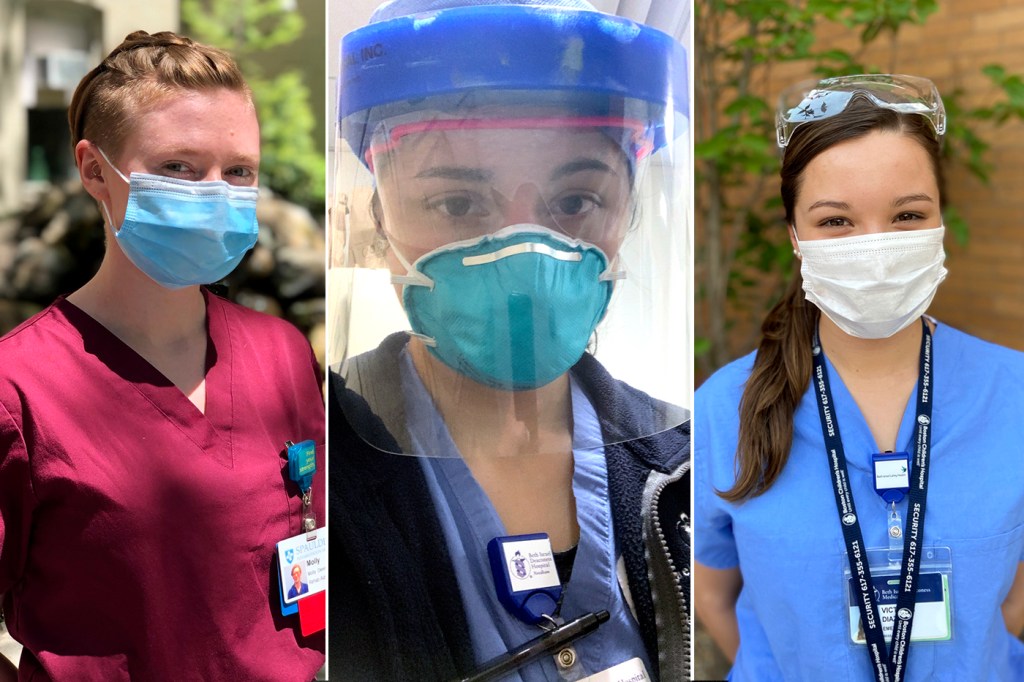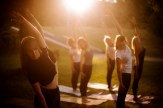Attending patients in the COVID-19 pandemic, ‘We have to treat everybody as though they have it’

During her shifts at two hospital emergency departments in Boston, Victoria Diaz braces for COVID-19 cases, whether they’re obvious or not. Some patients arrive in need of immediate intubation.
“Sometimes other people who are completely asymptomatic come back positive,” says Diaz, a rising fifth-year nursing student at Northeastern. “We have to treat everybody as though they have it.”
Many Northeastern students in healthcare have been working or serving co-ops at Boston-area hospitals throughout the pandemic. They have been putting themselves at risk while helping patients who may or may not be infected with SARS-CoV-2, the coronavirus that causes COVID-19.
“There is certainly risk involved, and I haven’t been able to see my friends and my family during these times,” says Diaz. “But I also know that I’m helping others during a pretty crucial time. And I think there are also unique lessons from this that I can take forward into my future career as a nurse.”
Here are a few of their stories.
Victoria Diaz
The pandemic has created the need for extra layers of protection for healthcare workers. During critical-care situations in her co-op at the Beth Israel Deaconess Medical Center emergency department in Boston, Diaz must quickly put on a gown, an N95 mask with an additional surgical mask on top, goggles, and gloves.
“During the pandemic, we are managing these emergency situations in all of our PPE, which is an added step to protect everyone involved,” says Diaz, who is from Cape Elizabeth, Maine. “At this point, we’re used to that.”
As a technician in both of her jobs—she also works at the emergency department at Boston Children’s Hospital, the site of her previous co-op—Diaz views herself as an extra set of eyes and ears for the nurses and doctors as she routinely takes vital signs, performs electrocardiograms, and obtains lab work. One of the challenges in the early days of the pandemic was adapting to the ever-changing protocols as her hospitals reacted to gains in information. Fortunately, Diaz has a strong support system available to her via daily FaceTime calls.
“My whole family is in healthcare,” she says. “My mom is a nurse, my dad is a doctor, and my brother just graduated from medical school and is finishing up his intern year. It’s been helpful to have them to talk to and bounce ideas off of and share similar experiences. I feel like even though I’m not with my family, we’re almost in it together.”
In years to come, she says, she will be drawing from the lessons of this difficult time—of believing in her colleagues as well as in herself.
“I’m proud of the healthcare system and how we’ve continued to persist and adapt through everything together,” Diaz says. “It’s a double-edged sword being part of the front lines during the pandemic. I’ve tried to be thankful that I’m privileged enough with my youth and good health to be able to show up and help people in need during the pandemic. But that’s not to say that it comes without an emotional toll.”
Molly Dennie
The department where Dennie works on co-op as a rehabilitation aide at Spaulding Hospital for Continuing Medical Care in Cambridge, Massachusetts, was originally a cardiopulmonary unit for people with heart and lung conditions. But the pandemic has forced a reconfiguration of the hospital to deal with COVID-19 patients. Her section now is for rehabilitating patients who have not tested positive for the coronavirus.
“We call them our chronic patients,” says Dennie, who is entering the fifth year of a six-year physical therapy program. “We have a lot of people who are very dependent—they need a lot of stretching, and they’re not really walking around.
“We’re also getting a lot of patients who have recovered from COVID-19, who have tested negative and need somewhere to finish their rehab. Most of those people are walking, they’re making really good progress. So it’s a really different patient population than we had before the pandemic.”
The coronavirus has forced many patients to remain distanced by spending more time in their own rooms. Dennie feels it is important to let the chronic patients know that their care is a priority at this time when so much attention is being paid to COVID-19.
Her work has added to her sense of responsibility whenever she walks outside with a mask or goes to the grocery store, where she follows all of the safety protocols to the letter.
“My biggest concern has always been about bringing it to work,” says Dennie, who is from Indianapolis. “The patients that I work with already have health conditions, and some of them don’t have strong immune systems. So I’m always super cautious about going to stores.”
Like other Northeastern students in healthcare, Dennie could have postponed or withdrawn from co-op during the pandemic and received full credit.
“I never really thought about stopping,” she says. “It’s not being at work that makes me uncomfortable. I love to be there, and I think if I didn’t have somewhere to go every day right now, I would be a lot worse off.”
Her responsibilities at the hospital have increased. Her self-confidence has been strengthened.
“I definitely feel like when I become a physical therapist, I will be ready to handle anything,” Dennie says. “I am just really grateful to have an opportunity to make any sort of impact on the healthcare system right now.”
Pauline Seremetis
Seremetis was working as an emergency department technician at Beth Israel Deaconess Medical Center in Needham, Massachusetts, when the public health crisis erupted. New information on COVID-19 and how to mitigate it was emerging every day.
“It was quite scary,” says Seremetis, who is in the accelerated 16-month nursing program at Northeastern. “I was talking with other doctors and other nurses and we were unsure. We were watching Dr. [Anthony] Fauci [director of the National Institute of Allergy and Infectious Diseases] and making sure that we were wearing everything that we could.”
Her focus has been on patients, including those who are worried that they either have COVID-19 or may be exposed to it at the hospital.
“We’ve seen a lot of patients who are coming in with other issues,” says Seremetis, who is from North Easton, Massachusetts. “We mask all of our patients before they come into the emergency room to protect them, but they have been concerned by everything they’ve been seeing in the news on a daily basis.”
Seremetis has appreciated the counsel and support she has received while working alongside medical professionals.
“All of us—the nurses and doctors and technicians—were in the break room the other day reminding each other that you just have to be careful,” Seremetis says. “Everything that you touch, wipe everything down, perform adequate hygiene, don’t bring it home. It’s just a different world now that we live in.
“My colleagues and I are staying positive. We know that we can get through this together.”
For media inquiries, please contact media@northeastern.edu.






